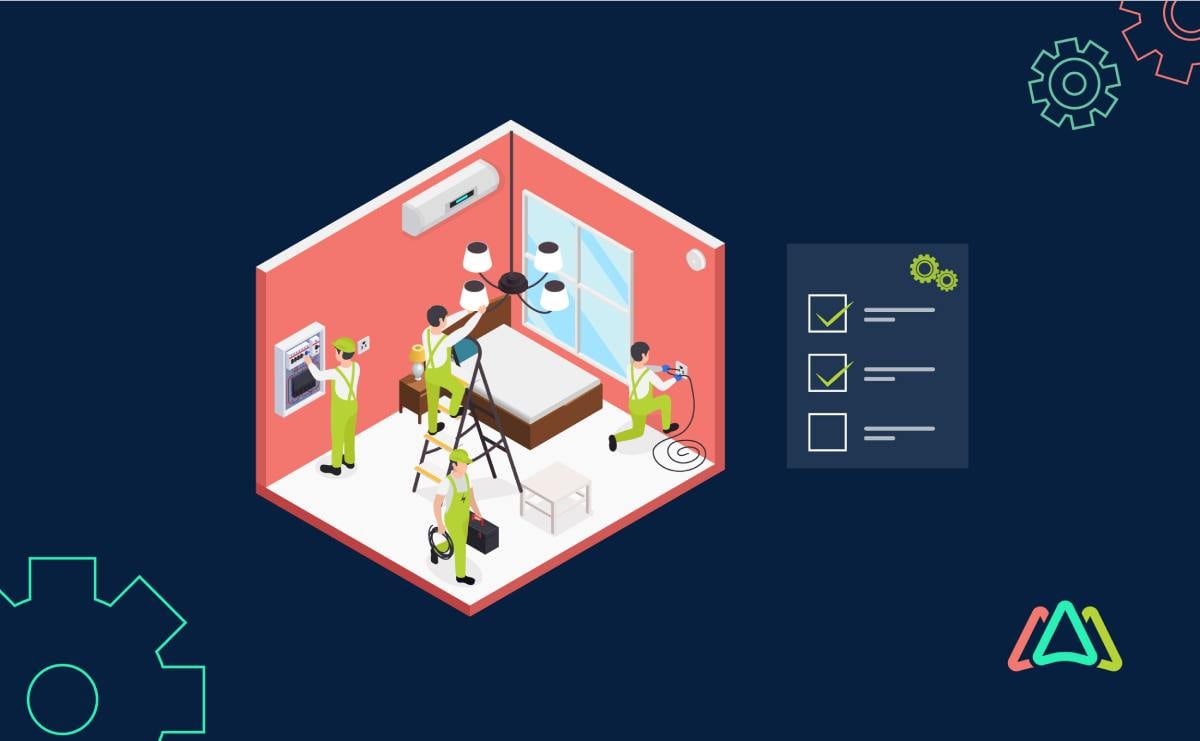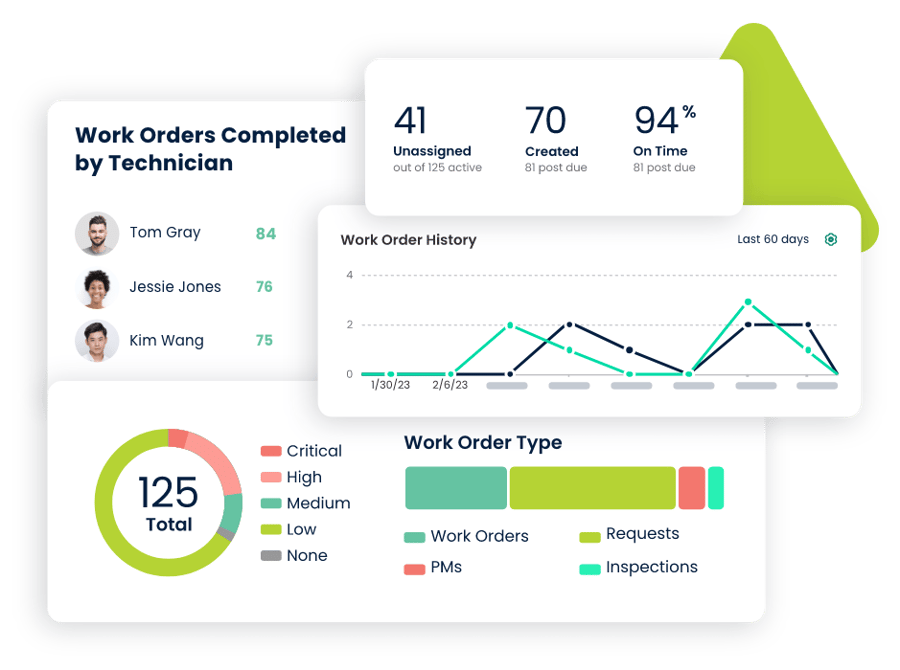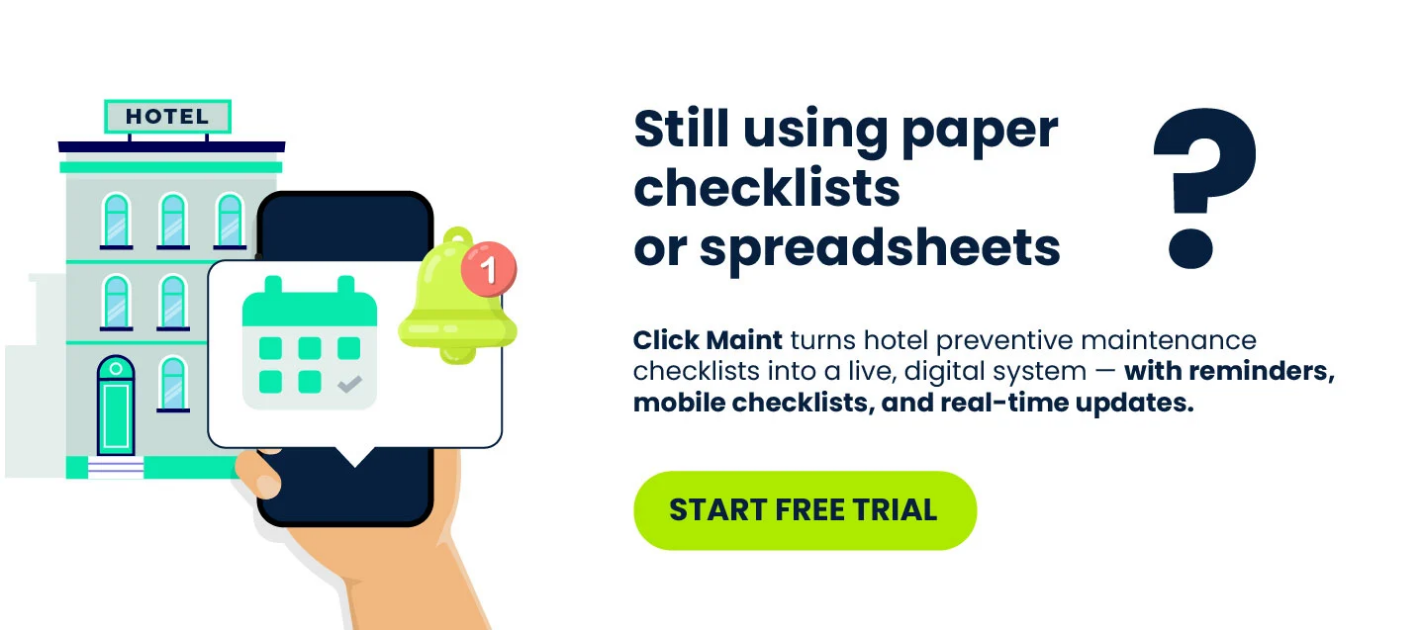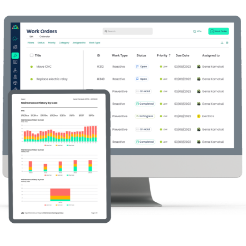
Hotel Preventive Maintenance Checklist: Ensuring Critical Assets are Running
The hospitality industry thrives on providing exceptional guest experiences, and the role of preventive maintenance in achieving this cannot be overstated. When guests enter a hotel, they expect a comfortable, safe, and hassle-free environment.
Whether you're a seasoned hotelier or just starting in the industry, we aim to equip you with the knowledge and tools to maintain a facility that consistently delivers exceptional guest experiences while optimizing your operational costs.
Importance of Preventive Maintenance in the Hospitality
Preventive maintenance is the proactive approach to maintenance that seeks to identify and address potential issues before they escalate into costly, disruptive problems. In the hotel industry, where every guest interaction matters, preventive maintenance is essential.
- Preserving Reputation: A hotel's reputation is built on guest experiences. A malfunctioning elevator, a leaky faucet, or a room without A/C can tarnish the hotel’s reputation quickly. Preventive maintenance ensures that such issues are identified and fixed before guests notice them.
- Cost Savings: Reactive maintenance is often more expensive and leads to unhappy guests. On the other hand, preventive maintenance is cost-effective as it avoids costly emergency repairs and downtime and prolongs the lifespan of your equipment and facilities.
- Guest Safety and Comfort: The safety and comfort of your guests is always top priority. Regular inspections and maintenance of HVAC, plumbing, and electrical systems ensure safety and contribute to a comfortable and pleasant stay.
How a Well-Structured Preventive Maintenance Checklist Can Improve Guest Satisfaction
- Consistency: Guests expect a consistent experience. A structured preventive maintenance checklist ensures that maintenance tasks are consistently carried out, reducing the chances of guests encountering unexpected issues during their stay.
- Quick Issue Resolution: By identifying and addressing potential problems early, a checklist ensures that necessary repairs or replacements are completed swiftly, minimizing guest inconvenience.
- Improved Facility Condition: Regular maintenance keeps the hotel facilities in good condition, which directly impacts guest comfort and enjoyment. Every aspect contributes to guest satisfaction, from well-functioning elevators to perfectly temperature-controlled rooms.
- Enhanced Staff Productivity: A structured checklist helps the maintenance staff work more efficiently by clearly stating which tasks to prioritize and ensuring they don't overlook critical maintenance needs. This efficiency translates into improved service for guests.
Developing a Comprehensive Hotel Preventive Maintenance Checklist
Creating a comprehensive preventive maintenance checklist is the foundation of a proactive maintenance strategy for a hotel. This checklist is the roadmap to ensuring that all critical areas and assets are regularly inspected, serviced, and kept in optimal condition. By identifying and addressing potential issues in advance, hotel management can improve guest satisfaction and reduce operational costs.
1. Identifying Critical Areas and Assets
1.1 HVAC Systems
Your hotel's heating, ventilation, and air conditioning (HVAC) systems are integral to guest comfort. Include regular checks for:
- Cleaning and replacing air filters.
- Inspecting and cleaning ductwork.
- Testing thermostat functionality.
- Ensuring proper drainage and condensate removal.
- Assessing the condition of HVAC units and scheduling regular servicing.
1.2 Plumbing and Fixtures
Efficient plumbing is essential for guest rooms, kitchens, and public restrooms. Your checklist should incorporate tasks such as:
- Checking for leaks and fixing them promptly.
- Inspecting faucets, showerheads, and toilets for wear and tear.
- Flushing water heaters to remove sediment buildup.
- Verifying proper water pressure.
- Clearing drains and sewer lines.
1.3 Electrical Systems
Electrical systems are vital not only for lighting but also for various hotel operations. Consider including:
- Testing electrical outlets and switches.
- Inspecting wiring for signs of damage or wear.
- Servicing circuit breakers and panels.
- Checking emergency lighting and exit signs.
- Ensuring proper grounding and surge protection.
1.4 Building Structure and Exterior
The physical integrity of your hotel is essential for guest safety and satisfaction. Regular maintenance should encompass:
- Roof inspections for leaks or damage.
- Exterior wall and window checks.
- Assessing the condition of walkways and parking lots.
- Ensuring proper drainage to prevent water damage.
- Checking for pest infestations and taking preventive measures.
1.5 Guest Rooms and Common Areas
The quality and cleanliness of guest rooms and common areas significantly impact guest satisfaction. Your checklist should include:
- Regular room inspections for wear and tear.
- Cleaning and replacing carpets and upholstery.
- Inspecting and servicing in-room amenities (TVs, phones, minibars).
- Testing fire safety equipment in common areas.
- Cleaning and maintaining elevators.
1.6 Kitchen and Food Service Equipment
Kitchens are the heart of any hotel, and their smooth operation is essential. Maintenance tasks should encompass:
- Cleaning and servicing kitchen appliances (ovens, refrigerators, dishwashers).
- Checking and maintaining exhaust and ventilation systems.
- Inspecting fire suppression systems.
- Ensuring food storage safety (temperature checks, pest control).
- Verifying the condition of dining furniture and fixtures.
2. Creating a Maintenance Schedule
2.1 Daily, Weekly, Monthly, Quarterly, and Annual Tasks
A well-rounded maintenance schedule covers tasks of varying frequencies. Here's a breakdown:
- Daily Tasks: These tasks are performed daily to address immediate concerns. Examples include checking HVAC systems, inspecting public areas for cleanliness, and testing emergency lighting.
- Weekly Tasks: These tasks focus on regular upkeep and inspection. They may include water quality tests, elevator inspections, and guest room inspections to ensure amenities are functioning correctly.
- Monthly Tasks: Monthly tasks dive deeper into the maintenance routine. Examples include deep cleaning of carpets and upholstery, checking for plumbing leaks, and testing fire alarm systems.
- Quarterly Tasks: Quarterly tasks often involve more extensive inspections and maintenance. Roof inspections, generator tests, and pest control are some examples.
- Annual Tasks: These are comprehensive yearly tasks that ensure the longevity of critical systems. Full HVAC system servicing, painting, safety audits, and structural assessments fall into this category.
2.2 Aligning Maintenance Tasks with Occupancy Levels
Hotel occupancy levels fluctuate, and maintenance schedules should adapt accordingly. During peak occupancy, you should focus on less intrusive tasks that won't disrupt guests. Conversely, lower occupancy periods allow for tackling more extensive maintenance projects without inconveniencing guests. Aligning your schedule with occupancy levels ensures efficient maintenance activities and guest satisfaction remains high.
3. Prioritizing Tasks
3.1 Classifying Tasks as Routine, Preventive, or Predictive
Prioritizing tasks is essential to allocate resources effectively. Consider categorizing tasks as follows:
- Routine Tasks: These are repetitive tasks that require regular attention, such as daily cleaning and basic equipment checks. They are vital for day-to-day operations.
- Preventive Tasks: These tasks aim to prevent potential issues and are typically scheduled at specific intervals. Examples include changing HVAC filters or inspecting fire extinguishers. Preventive tasks save you from dealing with more costly reactive repairs.
- Predictive Tasks: Predictive maintenance involves using data and technology to anticipate when equipment might fail. This allows for targeted maintenance to replace or repair components before they break, reducing downtime and costs. Predictive maintenance requires IoT devices, like sensors and CMMS software, to identify assets that need attention before breaking down.
3.2 Addressing Urgent Issues Promptly
While preventive maintenance is essential, urgent issues can arise unexpectedly. It's important to have a protocol in place for handling emergencies. Protocols may include having an on-call maintenance team, readily available spare parts, and clear procedures for addressing urgent issues promptly. Timely responses to emergencies can minimize guest inconvenience and prevent minor problems from escalating into major disruptions.
Sample Preventive Maintenance Checklist for HotelsA well-structured preventive maintenance checklist is the backbone of an efficient hotel maintenance program. By breaking down tasks into daily, weekly, monthly, quarterly, and annual schedules, you ensure that your property remains in top condition. Here's a sample preventive maintenance checklist explicitly tailored for the hotel industry:
|
Frequency |
Task |
Description |
|---|---|---|
|
Daily |
HVAC System Checks |
|
|
Inspection of Public Areas |
|
|
|
Testing Emergency Lighting |
|
|
|
Weekly |
Water Quality Tests |
|
|
Elevator Inspections |
|
|
|
Guest Room Inspections |
|
|
|
Monthly |
Deep Cleaning of Carpets and Upholstery |
|
|
Checking for Plumbing Leaks |
|
|
|
Testing Fire Alarm Systems |
|
|
|
Quarterly |
Roof Inspections |
|
|
Generator Tests |
|
|
|
Pest Control |
|
|
|
Annual |
Full HVAC System Servicing |
|
|
Painting and Touch-Ups |
|
|
|
Safety Audits |
|
Utilizing a CMMS to Create and Maintain Preventive Maintenance Checklists for Hotels
How a CMMS Helps
A hotel CMMS is a multifaceted platform designed to streamline maintenance operations and improve efficiency. Here's how it can assist hotels in creating and managing preventive maintenance checklists:
- Centralized Data Storage: At the core of CMMS is its role as a centralized hub for all maintenance-related data. This encompasses vital information about equipment, maintenance history records, the checklists themselves, and planned schedules. What's invaluable is that hotels can access and update their preventive maintenance checklists seamlessly from a single, user-friendly interface.
- Automated Scheduling: CMMS software brings automation to the forefront by scheduling preventive maintenance tasks with precision based on predetermined frequencies. This means that no task, regardless of how routine, is ever inadvertently overlooked. The beauty lies in the consistency and automation it imparts to maintenance routines.
- Customizable Checklists: The flexibility of CMMS empowers hotels to craft tailored checklists that align seamlessly with their unique requirements and equipment profiles. This adaptability ensures that checklists can be adjusted easily to accommodate changes in equipment or evolving procedural nuances.
- Real-Time Updates: CMMS facilitates real-time updates and tracking of maintenance tasks. Maintenance staff can swiftly report task completions, and management can monitor progress remotely. Such transparency enhances accountability across the maintenance hierarchy.
- Inventory Management: CMMS further extends its reach by seamlessly integrating inventory management. This ensures that the necessary parts and supplies are perpetually available for preventive maintenance tasks, effectively minimizing downtime associated with waiting for replacement components.
- Robust Reporting and Analytics: CMMS software is a treasure trove of data that translates into comprehensive reports and analytics. These insights provide rich insights into maintenance performance, enabling hotels to refine their preventive maintenance strategies and foster a culture of continuous improvement.
Benefits of Using CMMS for Tracking and Managing Maintenance Tasks
The adoption of CMMS software for preventive maintenance in hotels offers numerous benefits:
- Heightened Efficiency: CMMS introduces automation to mundane tasks, unburdening maintenance staff from administrative chores and enabling them to focus on hands-on maintenance work.
- Cost Savings: By nipping maintenance issues in the bud before they snowball into costly emergencies, CMMS assists hotels in conserving resources, reducing repair costs, and prolonging equipment lifespans.
- Elevated Guest Satisfaction: Improved facility upkeep achieved through efficient maintenance translates into fewer disruptions for guests. The result? Higher guest satisfaction and a steady stream of positive reviews and referrals.
- Better Accountability: CMMS documents maintenance tasks and assignees, elevating staff and vendor accountability and ensuring that tasks are completed.
- Regulatory Compliance: CMMS helps hotels comply with regulatory standards by aligning maintenance activities and accurately documenting each step, making it an invaluable resource during audits.
Monitoring and Evaluation of Hotel Preventive Maintenance Checklists
The journey doesn't end with the creation and implementation of checklists. It is important to establish a system of continuous monitoring and evaluation to ensure that these checklists remain effective and aligned with the evolving needs of the hotel and its guests. A hotel maintenance software enables this monitoring and evaluation. And this is how hotel maintenance software solves pain points.
Regularly Reviewing the Effectiveness of Hotel Preventive Maintenance Checklists
- Performance Assessment: Regular reviews allow hotel management to assess how well the preventive maintenance checklists are performing in practice. It involves evaluating whether the scheduled tasks are completed, whether maintenance schedules are adhered to, and the overall efficiency of the maintenance processes.
- Outcome Analysis: These reviews delve into the outcomes of preventive maintenance efforts. Are equipment failures decreasing? Has guest satisfaction improved? Are maintenance costs within control? Is equipment uptime increasing? It’s important to Identify both positive outcomes and areas for improvement.
- Compliance and Standards: Ensure that the preventive maintenance checklists adhere to industry standards, local regulations, and other requirements. Regular reviews help identify and rectify any deviations that might compromise compliance.
Making Necessary Adjustments Based on Performance Data
- Data-Driven Decision Making: Harness the data collected from preventive maintenance checklists to make informed decisions. Identify trends, recurring issues, or areas where performance is lacking. These insights guide you in making necessary adjustments.

- Optimizing Schedules: If certain tasks consistently disrupt guests during peak occupancy or overlap with other essential operations, consider adjusting the maintenance schedule to minimize inconvenience while maintaining effectiveness.
- Resource Allocation: Analyze the allocation of resources, including staff levels, spare parts inventory, and external vendor contracts. Make adjustments as needed to optimize resource utilization and ensure the smooth execution of maintenance tasks.
- Updating Checklists: As equipment evolves or new technologies emerge, regularly update preventive maintenance checklists to ensure they remain relevant and effective in addressing the maintenance needs of modern systems.
In a nutshell, CMMS stands as a transformative technology for hotel maintenance and management. Its prowess lies in its ability to streamline processes, foster accountability, and improve guest satisfaction. By seamlessly integrating CMMS into their maintenance strategies, hotels can orchestrate a harmonious symphony of maintenance tasks that ensures the uninterrupted comfort and satisfaction of their guests.
TABLE OF CONTENTS
Keep Reading
School facilities are busy, high-traffic places. On average, 45.8 million students attend ...
10 Feb 2026
There is also no shortage of acronyms in the maintenance world. So, here is one more to add ...
6 Feb 2026
You may be wondering: if you are already using CMMS software in your organization, aren’t ...
5 Feb 2026
Although artificial intelligence (AI) has been around since the mid-1950s, it wasn’t until ...
3 Feb 2026
Fire safety is often treated as a compliance checkbox rather than an ongoing operational ...
30 Jan 2026
Schools are regarded as places of learning where children are exposed to the basics of ...
29 Jan 2026
Facility maintenance, much like running a business, defies one-size-fits-all solutions. The ...
27 Jan 2026
When we think of inspections, we usually think about ensuring regulatory compliance and ...
23 Jan 2026
In maintenance operations, having the right spare parts in the right amount and at the right ...
22 Jan 2026
The relentless march of technology continuously reshapes the industry landscape, and with it, ...
20 Jan 2026
New Year’s resolutions tend to focus on lifestyle or financial changes, often aimed at making ...
16 Jan 2026
Now that 2026 has arrived, we’ll see that manufacturing trends will matter more than ever, as ...
15 Jan 2026
Now that 2026 is here, it’s a great time to assess what can be achieved in maintenance ...
13 Jan 2026
2026 is when the role of a CMMS Software in capital allocation comes to the fore. This is the ...
12 Jan 2026
Choosing the right work order software is no longer optional for maintenance teams in 2026. ...
6 Jan 2026
By 2026, CMMS platforms will no longer be the limiting factor in maintenance performance. ...
30 Dec 2025
Spare parts management within maintenance can make the difference between a problem-free ...
16 Dec 2025
Every maintenance team eventually faces the same question: When should we repair, and when ...
12 Dec 2025
Enterprise Asset Management (EAM) software has become a cornerstone for organizations aiming ...
12 Dec 2025
Unexpected equipment breakdowns can disrupt operations, increase repair costs, and reduce ...
11 Dec 2025










